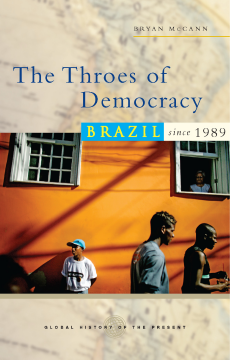
Additional Information
Book Details
Abstract
In the 1980s, Brazil emerged from two decades of military dictatorship and embarked on an experiment in full democracy for the first time in the nation's history Since then, Brazilians have sought to live up to the ideals of this experiment while negotiating dramatic economic and cultural transformations.
In The Throes of Democracy Bryan McCann gives a panoramic view of this process, exploring the relationships between the rise of the political left, the escalation of urban violence, the agribusiness boom and the spread of pentecostal evangelization. Brazil remains a land marked by deep inequality, but in the last two decades the structure of that inequality has changed substantially. This is a country which remains an endlessly vital source of popular culture, now bubbling forth from different corners of the map.
In explaining these transformations, this book provides a fascinating introduction to one of the 21st century's most significant countries.
Bryan McCann teaches Latin American history at Georgetown University, where he is Director of the Brazilian Studies Program. He is the author of Hello, Hello Brazil: Popular Music in the Making of Modern Brazil (2004). His current research focuses on the recent history of urban conflict in Rio de Janeiro.
'The Throes of Democracy offers a perceptive, and highly readable, interpretation of Brazil's recent past and present. An astute observer of politics, social mores, and popular culture, Bryan McCann constructs a portrait of contemporary Brazil that helps us to understand new and long-standing problems, while also accounting for Brazilian society's dynamism and ongoing democratization.'
Barbara Weinstein, New York University
‘Keen to innovation and tradition alike, McCann judiciously weighs forces shaping postdictatorial Brazil. He interrelates political economy and cultural politics with care and insight, encompassing oral, print and digital domains. This is a remarkable and resonant report on the current Brazilian republic.’
Charles A. Perrone, University of Florida
Table of Contents
| Section Title | Page | Action | Price |
|---|---|---|---|
| Acknowledgments | vii | ||
| Abbreviations | viii | ||
| Glossary | x | ||
| Chronology | xiii | ||
| Map | xv | ||
| Introduction | 1 | ||
| 1 | The rise of the left | 11 | ||
| Ideology and physiology | 13 | ||
| Whence the toad? The left’s deep background | 16 | ||
| Exile and underground | 19 | ||
| When the miracle ends | 22 | ||
| The reorganization of the left | 24 | ||
| From Diretas Já to impeachment | 27 | ||
| The postdictatorship | 28 | ||
| Enter FHC | 30 | ||
| Privatizations and re-election | 34 | ||
| The Lula years | 38 | ||
| Lula’s scandals | 42 | ||
| The new right | 45 | ||
| On balance | 48 | ||
| 2 | Urban crisis | 50 | ||
| Roots | 52 | ||
| Justiceiros and the CV | 55 | ||
| Redemocratization | 56 | ||
| The drug trade and organized crime | 58 | ||
| São Paulo | 62 | ||
| Pandora’s box | 65 | ||
| Favela-Bairro | 66 | ||
| The NGO boom and new security policies | 69 | ||
| 3 | Back to the land | 73 | ||
| The military regime and the origins of the MST | 75 | ||
| Cardoso and rural Brazil | 80 | ||
| Agrarian reform under Cardoso | 84 | ||
| Lula and the Amazon | 86 | ||
| The MST and biotech | 89 | ||
| 4 | Different drummers | 95 | ||
| Geração ’80 | 96 | ||
| Sertaneja | 102 | ||
| Salvador | 104 | ||
| Recife | 107 | ||
| Funk and hip-hop | 110 | ||
| 5 | The Pentecostal boom | 116 | ||
| Protestant Brazil | 117 | ||
| Neo-Pentecostals and mega-denominations | 119 | ||
| Who are Brazil’s crentes? | 123 | ||
| Rede Record | 125 | ||
| 6 | Making culture in digital Brazil | 131 | ||
| The Orkut Rule | 133 | ||
| Digital inclusion and Casas Bahia | 135 | ||
| Overmundo | 137 | ||
| Petrobras and company | 140 | ||
| Cinema | 142 | ||
| Publishing and music | 147 | ||
| Maecenas’ clerks | 149 | ||
| The virtual pistolão | 150 | ||
| Conclusion | 156 | ||
| Further reading | 160 | ||
| Notes | 163 | ||
| Index | 167 |
